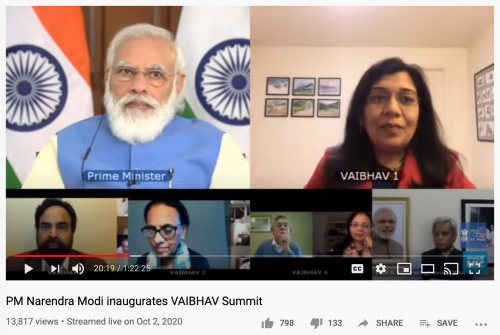Friday Focus: The power of yes
October 15, 2020

For some time now, I have been training myself to say no. I have also advised others, especially those of us who represent minority groups in higher academia, that it is OK to say no to help keep a work-life balance in our lives.
But the truth is that I haven’t always followed my own advice. I have oscillated between saying yes and no to requests that come across as a potential detour from my plans. Some of these detours have opened doors to new opportunities that were not on my radar and have contributed to my personal growth in remarkable ways.
Late last month, I was neck deep in preparing for UAF’s accreditation site visit when I received an email from the Indian embassy in the U.S. inviting me to participate in the inaugural event for a global summit with academicians from the India diaspora. The goal was to seed collaborations, strengthen the research and academic base in India, and contribute to discussions on India’s new education policy.
Those were clearly great goals that I deeply support, but with only two days left for the accreditation site visit, my mind said “No way!” As I was drafting a polite email explaining why I could not participate, I received a phone call from the embassy providing more details of the summit and requesting me to respond by the next day. I left the incomplete email as a draft and went home.
I had a restless night and got up early to check the event details. The instructions noted that I had to log on at 4 a.m. and would be done by 6:30 a.m. Alaska time, and the event was an interactive session with the prime minister of India. Technically, I could do both the panel and the site visit meetings. My mind and my heart were clearly at odds. The heart won and I responded with a yes. What followed was a chain of surprises and learning opportunities.
I had two minutes to convey my message, and I could do it in English or in any Indian language. When I learned that this event would be live telecast nationwide and the audience was every Indian citizen, I decided to switch my message from English to Hindi, my mother tongue.
The night before the event, I read out my pitch to my niece and she said, “Masi (Aunt), no one from my generation understands such (pure) Hindi. Speak to my generation.”
And therein I learned a vital lesson: It is really important that everyone from my generation have a next-generation mentor, as that is the best way to be aligned with the basic shift in thinking and perspectives that will shape the future.
The two-minute clip (from 18:20 to 19:40 minutes in this YouTube video ) had a far-reaching impact. It has enough English phrases in it to recognize my Nanook pride, and you can guess my key messages about UAF academics and research. I was one of the three women on a panel of 15 scientists, and my visibility as a leader was important for my nieces as well as other young women in terms of being relatable and instilling hope, aspiration, belief and confidence.
My family and friends were quick in sharing the post on social media, and there was an almost instantaneous outpouring of congratulatory messages. When asked how they felt, my mother said she “is walking taller” and my father said he felt that his “chest had expanded,” both translations of colloquial Hindi phrases that express real pride. It is a deeply gratifying and a surreal experience to see your family and friends smile and to know that you are the reason behind that smile.
The real reason for me to reflect so deeply on this recent experience is to share that no single approach is always right. Sometimes it is OK to contradict ourselves, remain flexible and not practice what we preach. There is just as much power and wisdom in saying no as there is in saying yes. We don’t have to always rely on conventional wisdom and follow the paved path. Sometimes a detour leads to new opportunities for personal growth and meaningful contributions. We just have to listen to our hearts, keep our minds open and embrace opportunities.


